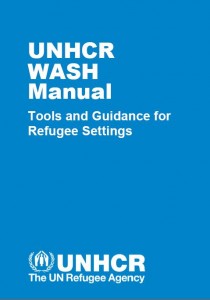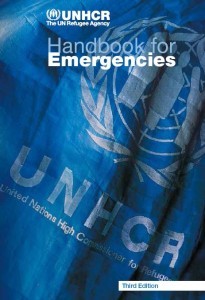
This template can be used to help UNHCR and WASH actors establish a simple WASH operational plan (WHO will do WHAT, WHERE, WHEN, and HOW and WHO will PAY and WHO will MONITOR). This template can be used in addition to the site level WASH Strategy Template.
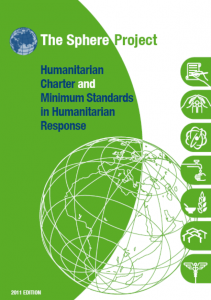
The Sphere Handbook is one of the most widely known and internationally recognized sets of common principles and universal minimum standards for the delivery of quality humanitarian response.
Tags: Bathing Facilities, Capacity Building, Communal Toilets, Cross Cutting, Disability, Disease Vector Control, Drainage, Environment, Excreta Management, Gender, Gender Based Violence, Grey Water Disposal, Handwashing with Soap, Household Water Treatment, Human Right to Water / Sanitation, Hygiene Promotion, Laundering Facilities, Menstruation Hygiene Management, Piped Water Networks, Protection, Public Health, Solid Waste Management, WASH Assessments, WASH Coordination, WASH Monitoring, WASH Programme Management, Water Quality Testing and Surveillance, Water Safety Plans, and Water Supply. Languages: English. Organisations: SPHERE. Categories: WASH Reference Documents.
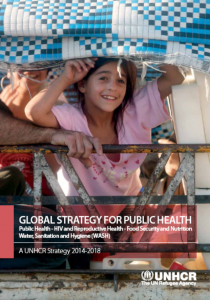
This document describes UNHCR’s global strategy for public health through a set of guiding principles and strategic approaches including protection; age, gender and diversity; equity; access; sustainability; community empowerment; appropriateness and reliability; partnerships and coordination; capacity building; communication and advocacy; integrated approaches; measurement and monitoring; and innovation. The document describes strategic objectives and enabling actions per sub-sector (Public Health, HIV and Reproductive Health, Food Security and Nutrition, and WASH).
Tags: Capacity Building, Disease Vector Control, Excreta Management, Gender, Gender Based Violence, Human Right to Water / Sanitation, Hygiene Promotion, Protection, Public Health, Value for Money, WASH Coordination, WASH Monitoring, WASH Strategy Development, and Water Supply. Languages: English. Organisations: UNHCR. Categories: WASH Guidelines, WASH Operational Guidelines, WASH Policy Guidelines, and WASH Reference Documents.
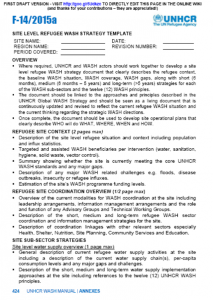
Where required, UNHCR and WASH actors should work together to develop a site level refugee WASH strategy document that clearly describes the refugee context, the baseline WASH situation, WASH coverage, WASH gaps, along with short (6 months), medium (6 months – 5 years) and long-term (>5 years) strategies for each of the WASH sub-sectors and the twelve (12) WASH principles. This template can be used to help produce the site level WASH Strategy.
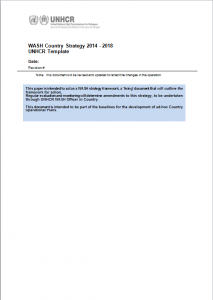
Where required, UNHCR and WASH actors should work together to develop a country level refugee WASH strategy document that clearly describes the refugee context, the baseline WASH situation, WASH coverage, WASH gaps, along with short (6 months), medium (6 months – 5 years) and long-term (>5 years) strategies for each of the WASH sub-sectors and the twelve (12) WASH principles. This template can be used to help produce the Country level WASH Strategy.
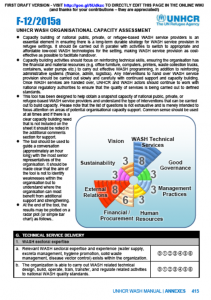
This tool has been designed to help obtain a snapshot capacity of national public, private, or refugee-based WASH service providers and understand the type of interventions that can be carried out to build capacity.
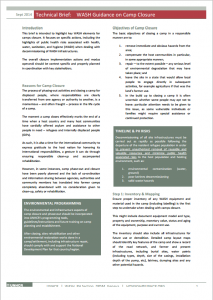
This brief is intended to highlight key WASH elements for camps closure. It focuses on specific actions, including the highlights of public health risks associated with health, water, sanitation, and hygiene (WASH) when dealing with decommissioning of WASH infrastructures. The overall closure implementation actions and modus operandi should be context specific and properly planned in coordination with key stakeholders.
Tags: Camp Closure, Cross Cutting, Environment, Excreta Management, Solid Waste Management, WASH Coordination, WASH Programme Health and Safety, WASH Programme Management, WASH Strategy Development, and Water Supply. Languages: English. Organisations: UNHCR. Categories: WASH Guidelines, WASH Operational Guidelines, WASH Policy Guidelines, and WASH Reference Documents.
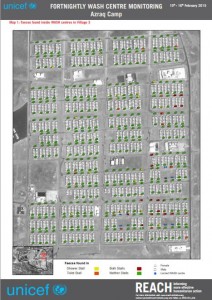
This document provides a snapshot of WASH service provision in Azraq Refugee Camp undertaken on the 15th – 16th February 2015. The document document provides an overview of the conditions in 912 WASH blocks with a focus on structural integrity, safety, access, and cleanliness.
 English
English








